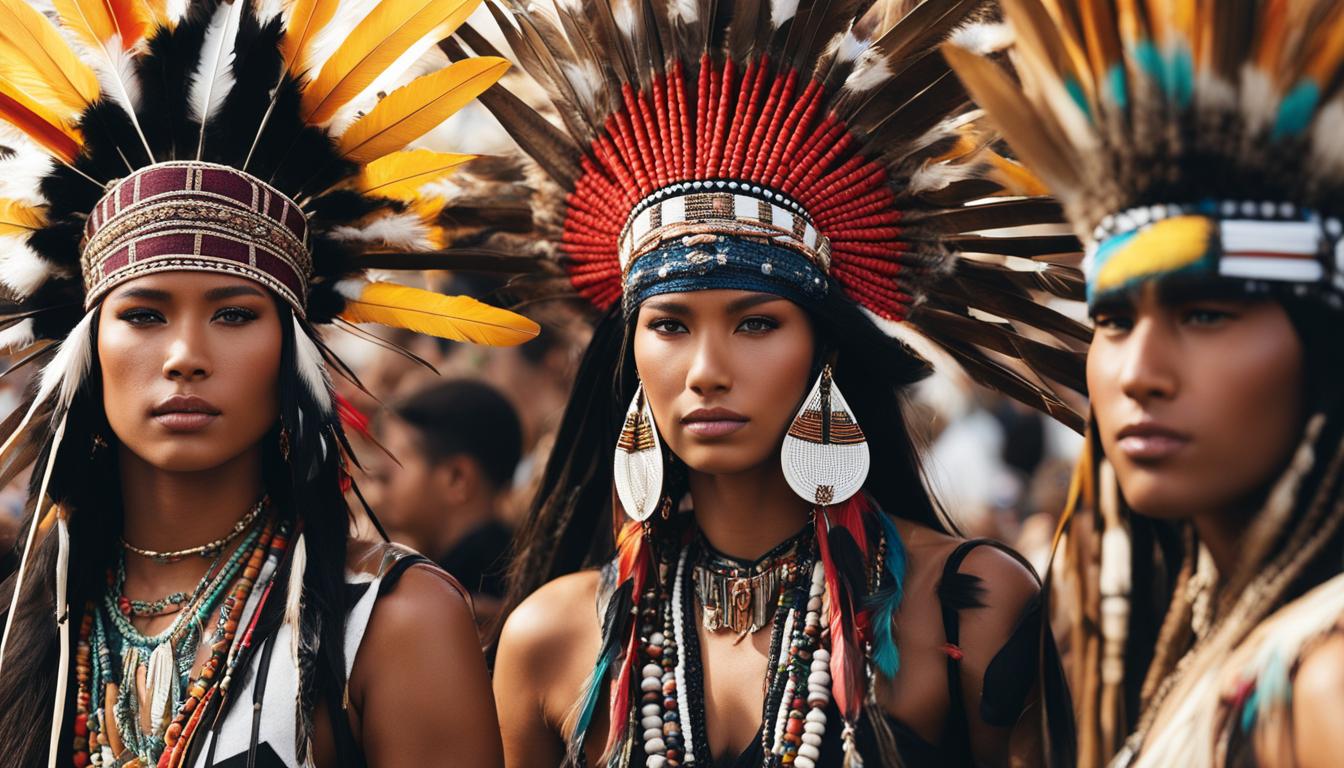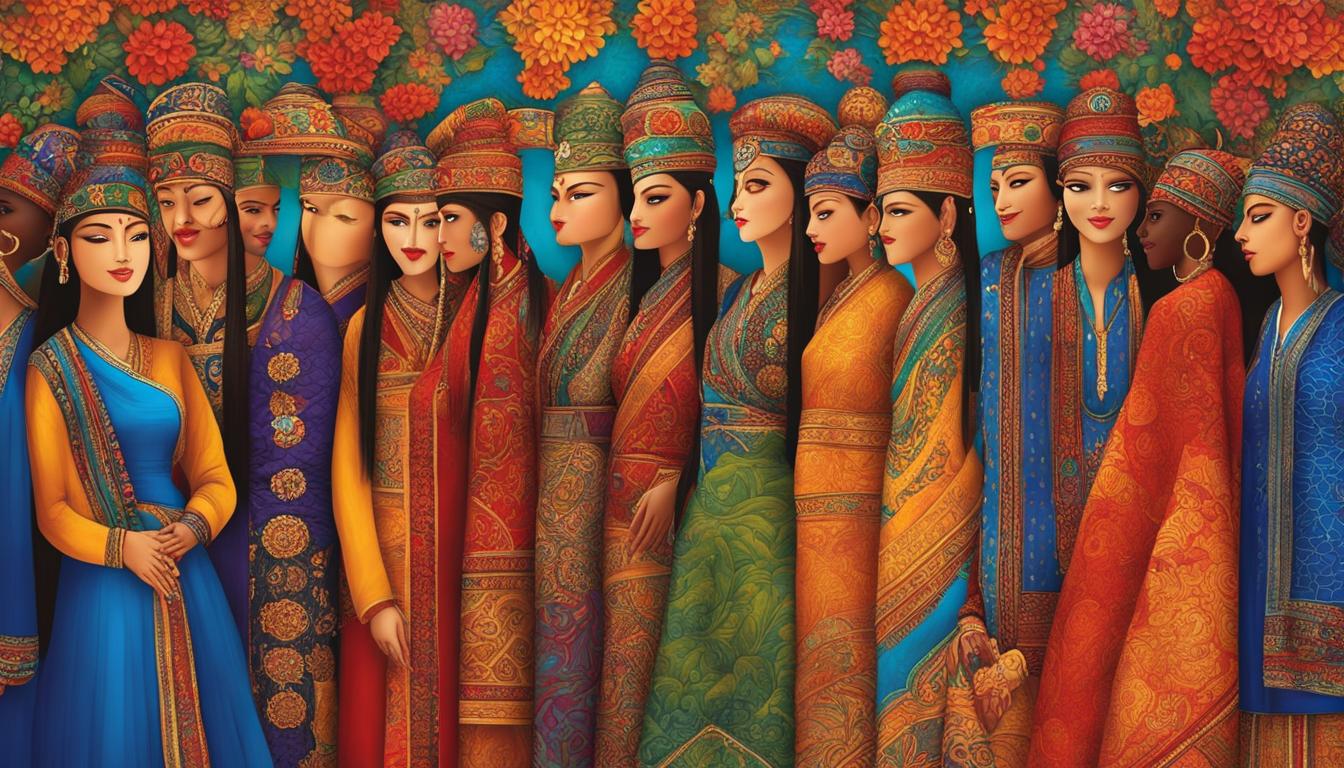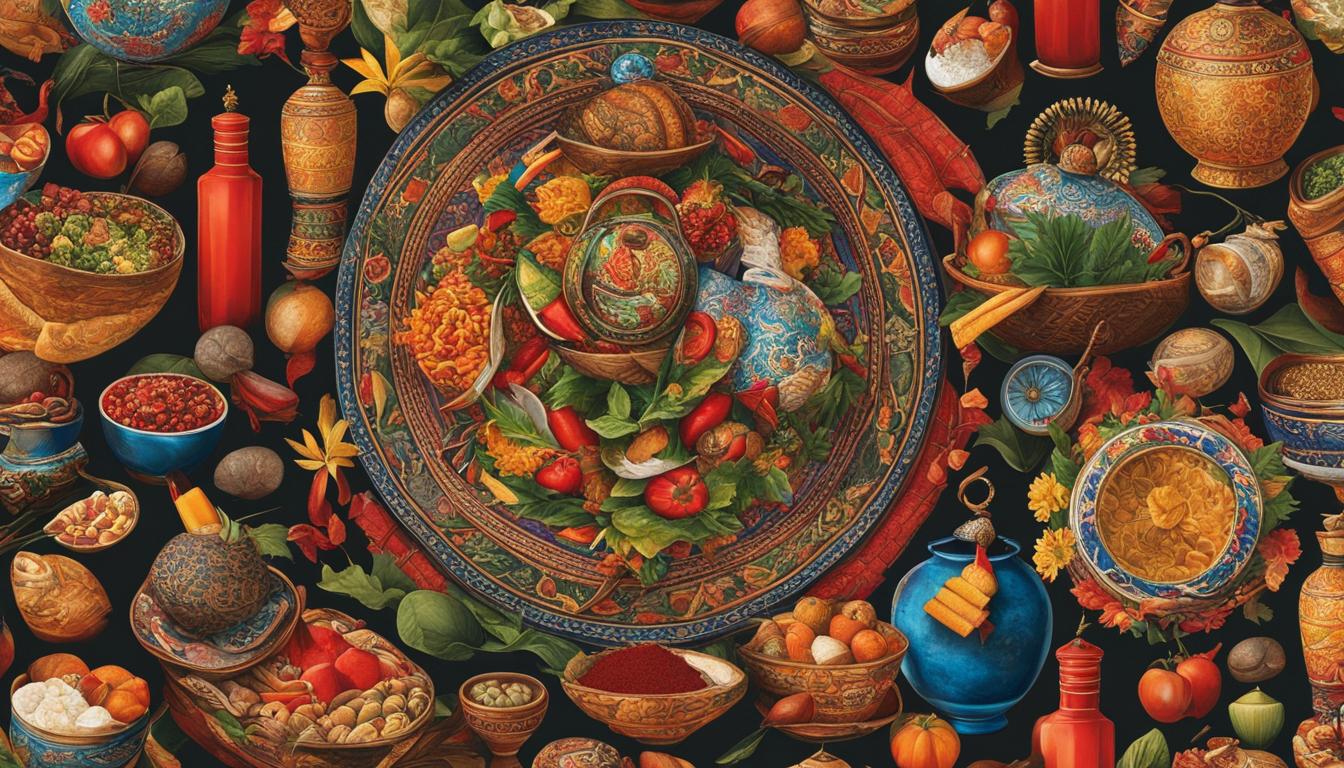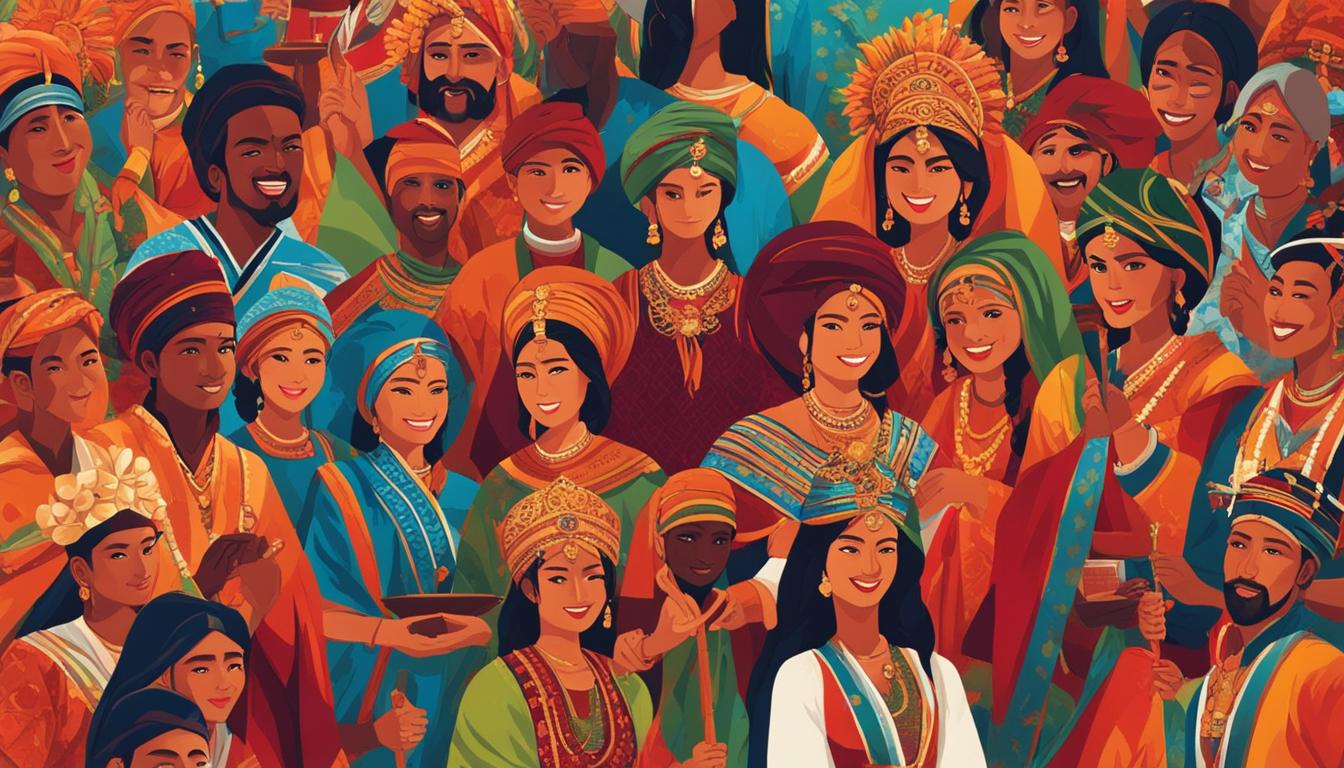Welcome to our article on cultural appreciation! In today’s diverse world, it is essential to foster understanding, respect, and inclusivity among different cultures and communities. Cultural appreciation allows us to explore and learn about the rich traditions, beliefs, and practices of others. By embracing cultural diversity, we can bridge divides, promote cross-cultural communication, and create a more inclusive society.
Key Takeaways:
- Cultural appreciation promotes understanding and respect for different cultures.
- It involves embracing cultural diversity and fostering inclusive communication.
- Being conscious and intentional is crucial in cultural appreciation.
- Educating ourselves about other cultures helps to deepen our understanding.
- Genuine cultural appreciation builds bridges and promotes diversity.
The Difference Between Cultural Appreciation and Cultural Appropriation
Cultural appreciation and cultural appropriation are two distinct concepts that are often misunderstood. Understanding the difference between the two is crucial in order to promote cultural understanding and avoid perpetuating harmful stereotypes that can deepen divides between communities.
Cultural appreciation involves genuinely wanting to learn and understand another culture’s traditions, beliefs, and practices. It focuses on respect and honor, acknowledging the value and significance of different cultures without appropriating or claiming them as one’s own. Cultural appreciation is about fostering cross-cultural communication and bridging gaps between communities.
Cultural appropriation, on the other hand, is the inappropriate adoption of elements from another culture without understanding or acknowledging their significance. It often involves taking superficial aspects of a culture, such as fashion trends, hairstyles, or symbols, without understanding their historical or cultural context. Cultural appropriation can perpetuate harmful stereotypes and disrespect the traditions and beliefs of the culture being appropriated.
It is important to recognize that cultural appreciation and cultural appropriation are not the same thing. Cultural appreciation promotes understanding and respect, while cultural appropriation can lead to misunderstandings and further divisions. By actively seeking to understand and appreciate different cultures in a genuine and respectful manner, we can foster a more inclusive and inclusive society that celebrates diversity.

“Cultural appreciation involves genuinely wanting to learn and understand another culture’s traditions, beliefs, and practices.”
Examples of Cultural Appropriation in Pop Culture
Cultural appropriation is prevalent in various aspects of pop culture, including music, art, fashion, and even language. It occurs when elements of one culture are adopted or borrowed by individuals or groups from a different culture without understanding or respecting the cultural significance behind them. This can perpetuate harmful stereotypes and contribute to the marginalization of certain communities.
In music, cultural appropriation can be seen when artists adopt styles, sounds, or aesthetics from other cultures without giving credit or properly understanding the cultural origins. For example, artists appropriating traditional Native American chants or African tribal rhythms for their own songs without acknowledging the cultural significance behind them.
Similarly, in the world of fashion, cultural appropriation often occurs when designers or brands appropriate elements of a specific culture’s traditional clothing, accessories, or symbols without recognizing their cultural significance. This includes using sacred objects as costumes or incorporating religious symbols without understanding their meaning.
Even language is not exempt from cultural appropriation. Adopting slang words or phrases from different cultures without understanding their cultural context can perpetuate stereotypes and contribute to the commodification of these cultures.

The Impact of Cultural Appropriation
Cultural appropriation in pop culture not only disregards the histories and traditions of marginalized communities but also reinforces harmful stereotypes. It can perpetuate a shallow and distorted understanding of different cultures, reducing them to mere fashion trends or entertainment. This, in turn, deepens divides between communities and undermines the importance of genuine cultural exchange and understanding.
“Cultural appreciation involves genuinely wanting to learn and understand another culture’s traditions, beliefs, and practices. It focuses on respect and honor. On the other hand, cultural appropriation is the inappropriate adoption of elements from another culture without understanding or acknowledging their significance. It can perpetuate harmful stereotypes and deepen divides between communities.”
It is crucial for individuals and industries involved in pop culture to recognize and address instances of cultural appropriation. By promoting cultural understanding, respect, and inclusivity, we can foster a more equitable and diverse society, where all cultures are honored and celebrated for their unique contributions.
How to Appreciate Other Cultures
In order to genuinely appreciate other cultures, it is important to involve the culture itself in the conversation. This means going beyond simply giving credit and actively engaging with people from that culture. By asking questions, inviting them to share their experiences, and truly listening to their perspectives, we can gain a deeper understanding and appreciation for their traditions, beliefs, and practices.
Being conscious and intentional is another crucial aspect of cultural appreciation. It requires us to be aware of the significance behind our actions and to strive to honor the culture rather than imitate it. This means avoiding stereotypes and taking the time to learn about the cultural context and historical background of the practices we are appreciating.
“When appreciating another culture, it is important to approach it with genuine curiosity and respect. Taking the time to understand the culture and engage with the people from that culture can lead to meaningful connections and mutual understanding.” – Cultural Appreciation Expert
Educating ourselves about the culture in-depth is also key to genuine cultural appreciation. This involves reading books, watching documentaries, and seeking out resources that provide accurate and nuanced information about the culture. By educating ourselves, we can develop a more nuanced understanding and avoid misconceptions or misappropriation.
The Importance of Going Beyond Credit
Giving credit alone is not enough when appreciating another culture. It is important to go beyond simply acknowledging the culture and involve the culture itself in the conversation. This means including people from that culture in the process, inviting them to contribute, and ensuring that their perspectives and experiences are valued and respected.
By involving the culture, we can truly honor and celebrate it rather than appropriating elements. This requires actively seeking to understand the significance of cultural traditions, beliefs, and practices, and valuing them for their cultural significance rather than reducing them to mere trends or fashion statements.
Involving the culture also helps us avoid misinterpretation and misrepresentation. By engaging in meaningful conversations and learning directly from those who belong to the culture, we can gain a deeper understanding and appreciation that goes beyond surface-level understanding.
Being Conscious and Intentional in Cultural Appreciation
When it comes to cultural appreciation, it is important to approach it with consciousness and intentionality. Understanding the significance of the culture you are engaging with is crucial to ensuring a genuine appreciation that goes beyond surface-level gestures. By taking the time to learn about the traditions, beliefs, and practices of a culture, you can avoid perpetuating harmful stereotypes and instead foster a deeper understanding.
Avoiding stereotypes is an essential aspect of conscious and intentional cultural appreciation. It is important to recognize that cultures are diverse and complex, and generalizations can often perpetuate misconceptions. By approaching cultural appreciation with an open mind and a willingness to challenge preconceived notions, you can develop a more nuanced understanding that truly honors and respects the culture.
It is also essential to examine your own motivations and intentions when engaging in cultural appreciation. Ask yourself why you are seeking to understand and appreciate a particular culture. Is it driven by a genuine desire to learn and connect, or is there a personal gain or validation at the core? By being honest with yourself and ensuring that your appreciation is rooted in genuine respect and curiosity, you can form meaningful connections and bridge cultural divides.
In conclusion, conscious and intentional cultural appreciation involves understanding the significance of the culture, avoiding stereotypes, and examining one’s own motivations. By approaching cultural appreciation with respect, curiosity, and a willingness to learn, we can foster mutual understanding and bridge divides between cultures.

Avoiding Stereotypes in Cultural Appreciation
- Avoid making assumptions or generalizations about a culture based on limited exposure or stereotypes.
- Recognize that cultures are diverse and individuals within a culture may have different beliefs and practices.
- Engage in open and respectful conversations with members of the culture to gain a deeper understanding.
- Challenge your own biases and preconceived notions about a culture.
- Seek out authentic sources of information, such as books, documentaries, or cultural organizations.
“Conscious and intentional cultural appreciation involves understanding the significance of the culture, avoiding stereotypes, and examining one’s own motivations.” – Anonymous
Avoiding Cultural Borrowing Without Understanding
When appreciating another culture, it is crucial to avoid borrowing elements without understanding their cultural significance. Cultural symbols and practices carry deep meaning and are often intertwined with the history, traditions, and values of a particular community. Without proper understanding, borrowing these symbols can inadvertently lead to misrepresentation and appropriation, perpetuating harmful stereotypes and disrespecting the culture.
Appreciating a culture involves more than just superficial imitation; it requires a genuine effort to comprehend and respect its nuances. Taking the time to learn about the culture in-depth, speaking to people from that culture, and engaging in meaningful conversations are essential steps in avoiding cultural borrowing without understanding. By actively seeking knowledge and fostering empathy, we can ensure our appreciation is genuine and sincere.
Understanding the cultural significance of symbols, rituals, and practices is crucial in avoiding cultural appropriation and promoting cultural sensitivity. Without this understanding, our actions can inadvertently contribute to the marginalization and erasure of cultural identities.
It is important to recognize that cultural appreciation is not about adopting elements of another culture for personal gain or validation. Instead, it is an opportunity to broaden our horizons, foster connections, and build bridges between different communities. By respecting the boundaries and understanding the cultural significance of what we engage with, we can appreciate other cultures in a way that is authentic, respectful, and meaningful.
Key Points:
- Avoid borrowing cultural elements without understanding their significance.
- Engage with the culture, learn from people, and have meaningful conversations.
- Respect the boundaries and cultural significance of symbols and practices.
- Cultural appreciation is not about personal gain; it is about fostering connections and understanding.

Educating Yourself and Reflecting on Cultural Influences
When it comes to cultural appreciation, one of the most important steps is to educate yourself and reflect on the cultural influences that shape our understanding of the world. By taking the time to learn about different cultures and their histories, we can develop a genuine care and concern for their traditions, beliefs, and practices.
Learning from history is crucial in this process. It allows us to understand the complex interplay of cultures throughout time and how they have influenced one another. By examining our own cultural influences and the origins of certain practices, we can gain a deeper appreciation for the diversity that exists in the world.

Having a genuine care and concern for other cultures means going beyond surface-level appreciation. It means actively seeking to understand and honor the cultural significance of different practices and traditions. By doing so, we can avoid inadvertently appropriating elements from other cultures and instead foster a sense of respect and admiration.
Reflecting on Cultural Influences
“To truly appreciate another culture, it requires an open mind and a willingness to learn and grow. Educating yourself about different cultures and reflecting on the cultural influences in your own life can help build bridges of understanding and create a more inclusive society.” – Dr. Maya Patel, Cultural Anthropologist
Educating yourself about different cultures can take many forms, from reading books and articles to attending cultural events and engaging in conversations with people from diverse backgrounds. It is through this process of education and reflection that we can cultivate a deeper and more meaningful appreciation for the rich tapestry of cultures that make up our world.
Genuine Cultural Appreciation: Building Bridges and Honoring Other Cultures
When it comes to cultural appreciation, it is essential to go beyond surface-level acknowledgment and truly engage with the traditions, beliefs, and practices of other cultures. Genuine cultural appreciation involves actively seeking opportunities to learn and understand, as well as honor and respect, the richness of different cultures. It is through these meaningful interactions that we can build bridges and foster a sense of unity among diverse communities.
One powerful example of genuine cultural appreciation is visiting a mosque to gain firsthand knowledge and understanding of the Muslim culture. By engaging in conversations, asking questions, and showing a genuine interest in learning, we can develop a deeper appreciation for the values and beliefs held dear by the Muslim community. This not only enriches our own understanding but also helps to bridge the gap between cultures, fostering a sense of empathy and respect.
Honoring other cultures is another crucial aspect of genuine cultural appreciation. This means recognizing and respecting the significance of cultural symbols, traditions, and practices without appropriating or diluting their meaning. By actively seeking to honor and celebrate other cultures, we create an environment that promotes inclusivity and diversity, cultivating mutual understanding and respect.
Building Bridges Through Cultural Events and Exchanges
To further foster genuine cultural appreciation, it is important to participate in cultural events and exchanges. These experiences provide opportunities for meaningful interactions, allowing us to engage with other cultures on a personal level. By attending cultural festivals, art exhibitions, or music performances, we can immerse ourselves in the vibrancy and beauty of different traditions. Moreover, participating in cultural exchanges, such as language classes or homestays, enables us to develop deeper connections, build friendships, and gain firsthand experiences of another culture’s way of life.
Education as a Key Component of Genuine Cultural Appreciation
Educating ourselves about the history, values, and contributions of different cultures is crucial for genuine cultural appreciation. By learning from credible sources, reading books, watching documentaries, or seeking guidance from cultural experts, we can develop a comprehensive understanding of the cultures we aim to appreciate. Education enables us to navigate cultural differences with respect and sensitivity, avoiding stereotypes or misinterpretations. With knowledge as our foundation, we can engage in meaningful dialogues and cultivate a genuine appreciation for the diversity that enriches our world.

In Summary
Genuine cultural appreciation goes beyond surface-level recognition and involves actively seeking to understand, honor, and respect the traditions, beliefs, and practices of other cultures. By engaging in meaningful interactions, such as visiting a mosque to learn more about the Muslim culture, we can bridge divides and foster unity among diverse communities. Building bridges through cultural events and exchanges, as well as educating ourselves about different cultures, are key components of genuine cultural appreciation. Let us continue to build a more inclusive and understanding world by valuing and celebrating the richness of all cultures.
Conclusion
Cultural appreciation plays a vital role in fostering understanding, empathy, and respect between different cultures and communities. It goes beyond mere acknowledgment and involves a genuine desire to learn, understand, and honor the traditions, beliefs, and practices of other cultures. By actively engaging with the cultures we appreciate and avoiding cultural appropriation, we can build bridges and forge connections that promote inclusivity and diversity.
Cultural appreciation is not about claiming another culture as our own, but rather about respecting and celebrating the rich tapestry of human experiences. It allows us to see the world through different lenses, expanding our horizons and challenging our perspectives. When we engage in cultural appreciation, we contribute to a more harmonious and inclusive society where differences are celebrated and cherished.
Understanding the importance of cultural appreciation is key to a more interconnected world. It helps break down barriers, dismantle harmful stereotypes, and cultivate meaningful relationships between individuals and communities. By valuing and exploring the diverse cultures around us, we promote a culture of curiosity, openness, and mutual respect.
In conclusion, cultural appreciation is not just a buzzword; it is an essential practice that can lead to a more inclusive, understanding, and compassionate society. Let us embrace cultural diversity, actively seek to learn, understand, and honor other cultures, and contribute to the creation of a truly interconnected global community.
FAQ
What is cultural appreciation?
Cultural appreciation is earnestly seeking to learn about and explore different cultures, respecting and honoring their beliefs, traditions, and practices without claiming them as one’s own.
What is the difference between cultural appreciation and cultural appropriation?
Cultural appreciation focuses on understanding and respecting other cultures, while cultural appropriation involves the inappropriate adoption of elements from another culture without understanding or acknowledging their significance.
Can you give examples of cultural appropriation in pop culture?
Cultural appropriation can be seen in various aspects of pop culture, including the adoption of slang words without understanding their cultural context, using sacred objects as costumes, and perpetuating stereotypes through fashion choices.
How can I appreciate other cultures?
To appreciate other cultures, it is important to involve the culture itself in the conversation. This means actively engaging with people from that culture, asking questions, and inviting them to share their experiences. It also involves understanding the significance of what we do and striving to honor the culture rather than imitate it.
Why is it important to go beyond giving credit when appreciating another culture?
Giving credit alone is not enough when appreciating another culture. It is important to involve the culture itself in the conversation, including people from that culture, inviting them to contribute, and ensuring that their perspectives and experiences are valued and respected. This helps to avoid appropriating elements of the culture and instead honor and celebrate it.
How can I be conscious and intentional in my cultural appreciation?
Being conscious and intentional in cultural appreciation involves understanding the significance of what we are doing, ensuring that we are honoring the culture rather than perpetuating harmful stereotypes. It also involves examining our own intentions and motivations, appreciating the culture for the right reasons and not for personal gain or validation.
How can I avoid borrowing elements from a culture without understanding their significance?
To avoid borrowing elements without understanding, take the time to learn about the culture in-depth, speak to people from that culture, and have meaningful conversations about their beliefs, traditions, and practices. This ensures that your appreciation is genuine and that you are not unintentionally appropriating aspects of the culture.
Why is educating ourselves about our own culture important for cultural appreciation?
Educating ourselves about our own culture and its relationship to other cultures throughout history is essential for genuine cultural appreciation. Reflecting on cultural influences helps us understand their origins, develop a genuine care for other cultures, and avoid appropriating elements without understanding their historical and cultural context.
Can you provide examples of genuine cultural appreciation?
Examples of genuine cultural appreciation include visiting a mosque to learn more about the Muslim culture firsthand, engaging in conversations, asking questions, and genuinely seeking to understand and honor the culture. These positive examples build bridges and foster understanding and respect between different communities.
Why is cultural appreciation important?
Cultural appreciation is crucial for fostering understanding, empathy, and respect between different cultures and communities. It involves genuinely seeking to learn, understand, and honor the traditions, beliefs, and practices of other cultures, promoting inclusivity and diversity.


